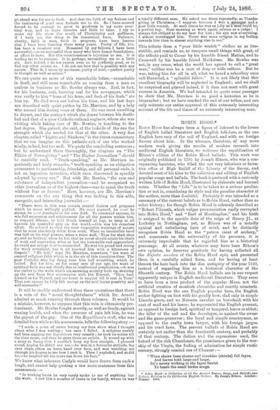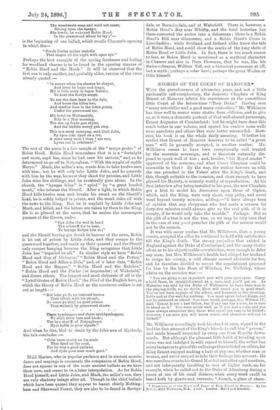ROBIN HOOD.*
ROBIN HOOD has always been a figure of interest to the lovers of English ballad literature and English folk-lore, as the one English hero racy of the soil of England, and with no foreign
flavour about him. In the absence, therefore, of any more modern work giving the results of modern research into medimval English literature, we welcome the republication of Ritson's edition of the Robin Hood ballads. This work was originally published in 1795 by Joseph Ritson, who was a con- veyancing barrister, who filled the not very laborious or lucre.- tive office of High Bailiff of the Liberty of the Savoy, and devoted most of his time to the collection and editing of English popular songs and ballads. The book is prefaced with a curiously written Life of Robin Hood, illustrated by elaborate and learned notes. Whether the "Life" is to he taken as a serious produc- tion or not is, considering its style and the peculiar character of the author, more than doubtful. Probably it was intended as a summary of the current beliefs as to Robin Hood, rather than as sober history ; for though Robin Hood is solemnly described as "Robert Fitzooth, which vulgar pronunciation easily corrupted into Robin Hood," and " Earl of Huntingdon," and his birth is assigned to the specific date of the reign of Henry IL, at Locksley in Nottingham, yet, as Ritson was of a notedly cynical and rmbelieviag turn of mind, and he distinctly recognises Robin Hood as the "patron saint of archery," and comments on the universality of his presence, it is extremely improbable that he regarded him as a historical personage. At all events, whatever may have been Ritson's own opinion, he deserves gratitude for having collected all the disjecta membra of the Robin Hood epic, and presented them in a carefully edited. form, and for having at least thrown the hero back into the dim antiquity of the year 1160, instead of regarding him as a historical character of the fifteenth century. The Robin Hood ballads are in one respect apparently unique in English mediaeval literature. They seem to have been a true product of the popular Muse, not the artificial creation of monkish chronicles and courtly minstrels. Robin Hood was the one English popular hero, the English archer fighting- on foot with his goodly bow, clad only in simple Lincoln green, and no Norman cavalier on horseback with his coat of mail and his lance; he represented the English peasant, as opposed to foreign herd, spiritual or temporal, baron or abbot; the tiller of the soil and the deerslayer, as against the owner
and the game-preserver ; the loyal and-simple countryman, as
opposed to the crafty town lawyer, with his foreign jargon and his cruel laws. The present ballads of Robin Hood are
certainly not earlier than the fourteenth century, and probably of that century. The diction and the expressions used, the
hatred of the rich Churchmen, the prominence given to the wor- ship of the Virgin, the feeling of admiration for simple rustic scenery, strongly remind one of Chaucer :-
" When shaws bane sheene and shroddea (shrubs) fall fayre, And leaves both large and lunge, Itt's merry walking in the fayre forrist To heftre the smell birds's songe.
• Robin Hood: a Collection of alt the Ancient Poems, Soaps, and Bela., new Extant, Relative to the Celebrated En2lieh Outlaw. By Joseph. Ritson. London : Nimmo• 1885.
The woodweele sang and wold not cease, Sitting upon the sprays Son lowde, be wakened Robin Hood, In the greenwood where he lay ;"-
is the beginning of one ballad, which recalls Chaucer's opening in which the-
" Snide fowles maken melodie That Bingen all the night with open eye."
Perhaps the best example of the spring freshness and feeling for woodland charms is to be found in the opening stanzas of " Robin Hood and the Monk." It will be observed that the first one is only another, and probably older, version of the verse already quoted :—
" In sourer when the ahawes be eheyne, And leves be large and lenge, Hit is fulle mery in fayre foreste, To hear the fowlys songs.
To tee the deft draw to the dale, And leave the hillea bee, And shadow hem in the levee grene, Under the greenwood tre.
Hit befel on Whitsontide, Erly in a May morning,
The sun up fayre gan shyne,
And the birddit merry gas sing.
This is a mery mornyng, said litell John, By hym that dyed on a tre,
A more mery man I than I am one, Lyves not in cristiante."
The rest of the poem is a fair sample of the " merye goatee" of Robin Hood. Robin Hood remembers that it is a " fortnight and more, sayd bee, since he had seen his saviour," and so he determined to go off to Notyngham, " With the myght of mylde Marye." Much, the miller's son, wants him to take twelve men with him ; bat he will only take Little John, and he quarrels with him by the way, because they shoot for pennies, and Little John wins five shillings, and he eventually goes alone. In the church, the " kynges felon" is " spied" by "a great hooded monk," who informs the Sheriff. After a fight, in which Robin Hood kills twelve men and breaks his sword on the Sheriff's head, he is safely lodged in prison, and the monk rides off with the news to the King. But he is waylaid by Little John and Much, and killed, and the letters are taken by them to the King.
He is so pleased at the news, that he makes the messengers yeomen of the Crown, and-
" Gav John the seal in hand The schereff for to bear, To brynge Robyn him to ;"
and the Sheriff having got drunk in honour of the news, Robin is let out of prison by Little John, and they escape to the greenwood together, and make up their quarrel; and the Sheriff only escapes hanging because the King recognises that Little John has "beguiled us all." In similar style we have "Robin Hood and Guy of Gisburne," "Robin Hood and the Potter," " Robin Hood and Allan-a-Dale," and, of a later date, "Robin Hood and the Beggar," " Robin Hood and the Butcher," " Robin Hood and the Pinder [or impounder] of Wakefield," and divers others. The longest and most elaborate of all is the "Lytell Gestes of Robin Hood," the Iliad of the English hero; in which the theory of Robin Hood as the courteous outlaw is set out at length :—
" But loke ye do no hoebond harms That tilleth with his plough, No more ye shall no good yeman
That walketh by greenwood shawe.
'nose byeshoppes and thyse archbysshoppes,
Ye shall them bete and biude ; The bye sheriff of Notynghame Hym holds in your mynde."
And when he dies, bled to death by the false nun of Kyrkesly, the tale concludes :-
" Crist have mercy on his souls That dyed on the rood, For he was a good outlaws
And dyde pore men much good."
Maid Marian, who in popular parlance and in ancient morris- dance and mayings is commonly the companion of Robin Hood, does not appear in any of the more ancient ballads as we have them now, and seems to be a later interpolation. As for Robin Hood himself, and Little John, and Much, the miller's son, they are very shadowy beings after all. Though in the chief ballads which have been quoted they appear to haunt chiefly Notting- ham and Sherwood Forest, they are also to be found in Barnys-
dale, or Barnsleydale, and at Wakefield. There is, however, a Robin Hood's Bay near Whitby, and the local historian has there converted the archer into a fisherman ; there is a Robin Hood's Hill near Gloucester, and a Robin Hood's Cross in Lincolnshire ; while Scotland and Ireland alike know the tale of Robin Hood, and could show the marks of the long shots of Robin Hood or Little John. In fact, there is too.much reason to fear; as Robin Hood is mentioned as a mythical character in Chaucer and also in Piers Plowman, that he was, like -his Swiss colleague, William Tell, not a historical personage at all, but a myth ; perhaps a solar hero; perhaps the great Woden or Odin himself.



































 Previous page
Previous page